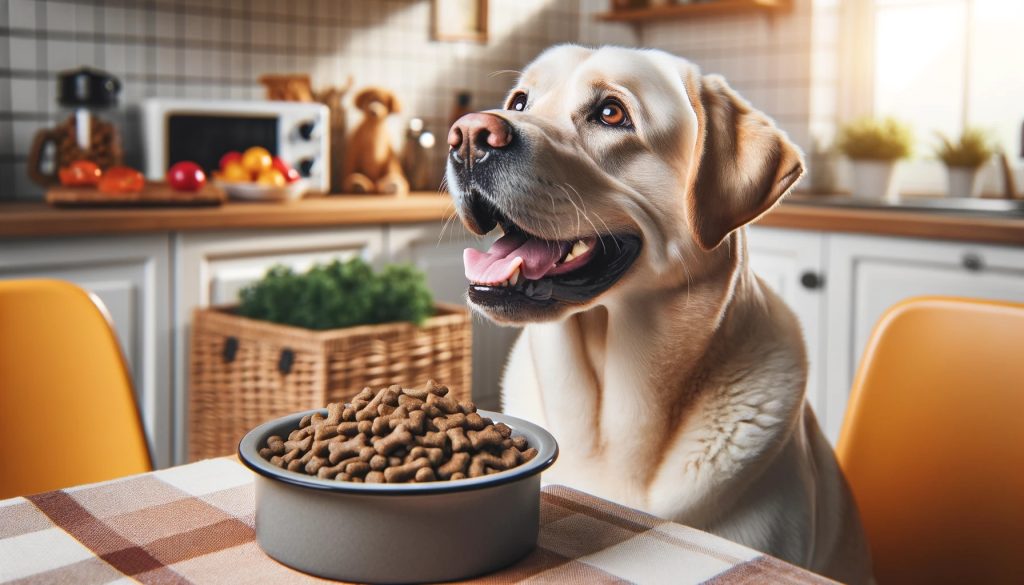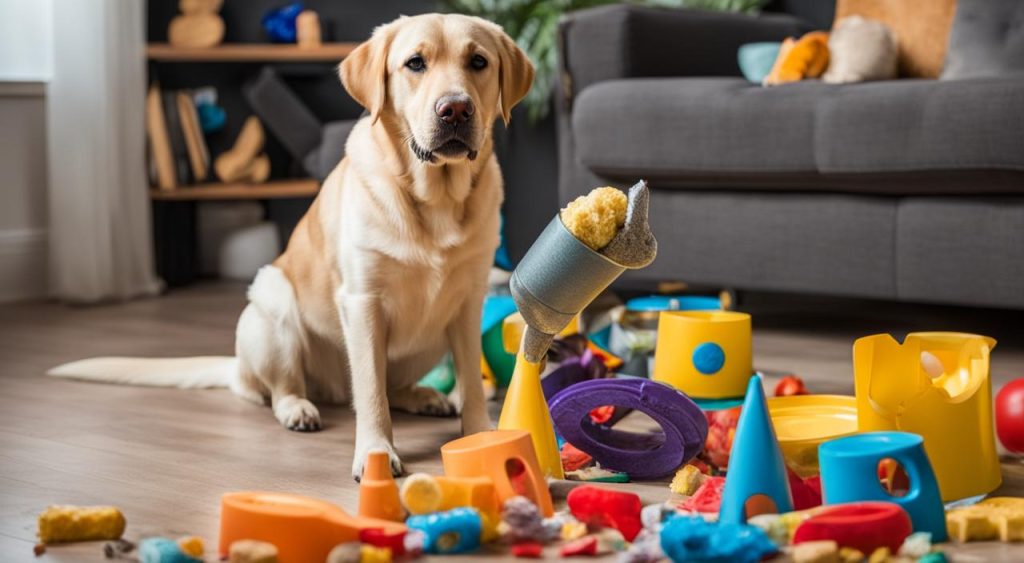Labrador retrievers are known for their love of food and constant hunger. Have you ever wondered why Labs always seem to have room for more, no matter how much they eat? In this article, we explore the scientific reasons behind Labs’ insatiable appetites and provide tips on how to manage their feeding schedule to maintain a healthy weight.
Key Takeaways:
- Labrador retrievers may have a gene mutation (POMC) associated with food-motivated behaviors, which prevents them from receiving signals in their brain that indicate they are full.
- Labradors that are trained using food rewards may develop an increased appetite due to constant food motivation.
- Underlying medical conditions such as parasitic infections, diabetes mellitus, gastrointestinal issues, Cushing’s disease, and cancer can contribute to a Labrador’s constant hunger.
- Proper management of a Labrador’s appetite and feeding schedule is crucial to prevent overeating and maintain a healthy weight.
- High-quality, meat-based dog food, portion control, slow feeders, and regular vet check-ups are essential for managing a Labrador’s incessant appetite.
Factors Contributing to Labs’ Constant Hunger
Apart from the gene mutation, Labradors may also overeat due to other factors. Labradors that are trained using food rewards may develop an increased appetite as a result of being constantly motivated by food.
Labradors are highly food-motivated dogs, and their instinctual drive for reward can lead to a perpetual quest for more food. This can contribute to their constant hunger and the tendency to overeat.
Additionally, underlying medical conditions can play a role in a Labrador’s insatiable hunger. Parasitic infections, such as worms, can impact the absorption of nutrients, leading to an increased appetite. Diabetes mellitus, a condition characterized by high blood sugar levels, can also cause excessive hunger in Labs.
Gastrointestinal issues, such as inflammatory bowel disease or malabsorption disorders, can affect nutrient absorption, leaving Labradors feeling perpetually hungry. Hormonal imbalances such as Cushing’s disease, a condition involving excessive cortisol production, can also increase appetite in Labs.
Cancer, although less common, can also contribute to a Labrador’s constant hunger. Tumors can alter a dog’s metabolism, leading to increased energy needs and a voracious appetite.
Nutritional deficiencies can result in an unbalanced diet, triggering hunger cues in Labradors. This highlights the importance of providing a well-rounded and nutritionally complete diet to ensure satiety and optimal health.
High levels of stress can also lead to overeating in Labradors. Just like humans, dogs may turn to food as a coping mechanism, seeking comfort and distraction from emotional stressors.
Addressing Factors for Optimal Lab Health
To optimize your Lab’s well-being and prevent excessive hunger, it’s crucial to identify and address underlying factors:
- Monitor your Labrador’s food rewards during training sessions, ensuring they are proportionate and balanced to avoid overstimulating their appetite.
- Work closely with your veterinarian to rule out and treat any underlying medical conditions that may contribute to constant hunger.
- Provide a nutritionally balanced and high-quality diet that meets your Lab’s specific dietary needs.
- Consider behavioral interventions or professional training to manage stress and prevent emotional overeating in your Labrador.
By taking these steps and addressing the factors that contribute to a Labrador’s constant hunger, you can optimize their health and well-being, ensuring they maintain a healthy weight and live a happy, fulfilled life.
Managing Labs’ Appetite and Feeding Schedule
Managing a Labrador’s appetite and feeding schedule is crucial to prevent overeating and maintain a healthy weight. To ensure your Lab remains satisfied and healthy, it is important to make informed choices about their diet and implement proper feeding practices.
Start by opting for high-quality, meat-based dog food that offers the right balance of nutrients and fiber. This will provide your Lab with the necessary fuel for their lab workload while promoting overall well-being. Consult with a veterinarian to determine the appropriate amount of food for your Lab based on factors such as their age, weight, and activity level.
Portion control plays a key role in managing your Lab’s appetite. By measuring their food accurately and dividing it into appropriate servings, you can prevent them from overeating. Avoid giving table scraps or human food, as they can contribute to weight gain and disrupt their lab productivity. Instead, consider using slow feeders or dog puzzles to slow down their eating speed, allowing them to enjoy their meals more mindfully.
In addition to a well-managed feeding schedule, regular vet check-ups are essential. This helps identify any underlying medical conditions that may contribute to appetite issues and affect their lab workflow. Your veterinarian can provide valuable guidance tailored to your Lab’s specific needs, ensuring they receive the necessary care and attention.
Do not write “Conclusion”,”Section”.





